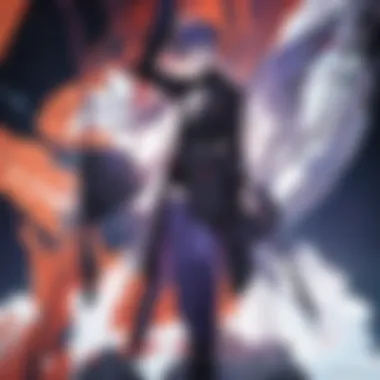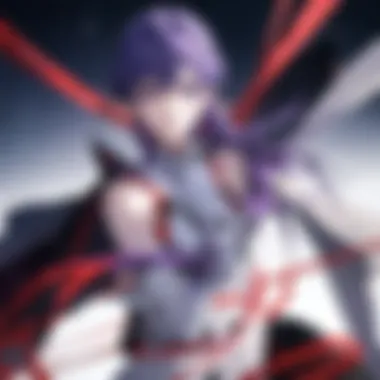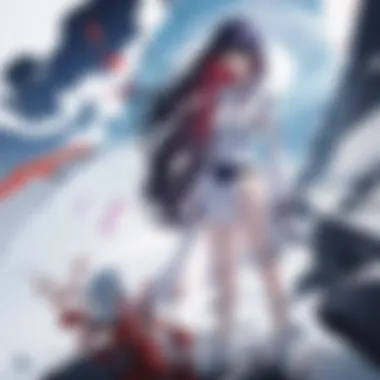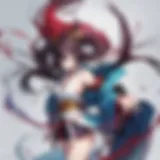Exploring the Evangelion Ring: Narrative and Symbolism


Intro
The intricate world of Neon Genesis Evangelion offers a rich tapestry of narrative and symbolism. Among its key elements is the Evangelion Ring. This article will analyze its multifaceted role within the narrative, exploring its origins and what it represents in the context of human emotion and existential struggles.
Anime Series Overview
Neon Genesis Evangelion is a prominent anime series created by Hideaki Anno that debuted in 1995. It centers around a post-apocalyptic world where humanity is under threat from mysterious beings known as Angels. The series follows young pilots, like Shinji Ikari, who control giant mechs called Evangelions to combat these threats.
One of the central themes is the exploration of psychological issues, touching upon anxiety, depression, and relationships. It is a commentary on the human condition, and its unique approach to character development sets it apart from traditional mech anime.
The animation style is notable for its blend of visually stunning action sequences with more subdued, dialogue-heavy moments. The soundtrack, composed by Shirō Sagisu, enhances the emotional depth of the series.
Key Themes
- Human emotion and existentialism.
- Trauma and personal growth.
- The struggle against isolation and connection.
Main Characters
- Shinji Ikari: A reluctant hero burdened by his expectations.
- Asuka Langley Soryu: Conflicted and proud, her journey represents self-acceptance.
- Rei Ayanami: A mysterious figure with deep ties to the series' core mysteries.
These characters evolve significantly throughout the series, reflecting their internal conflicts and external pressures. Notable episodes, such as Episode 16, showcase deep psychological themes through innovative storytelling.
The Significance of the Evangelion Ring
The Evangelion Ring serves as a pivotal symbol within the series. It embodies not only the concept of cycles—such as life, death, and rebirth—but also reflects the characters' emotional states. Shinji's journey through trauma and self-discovery parallels the looping structure suggested by the Ring. It's a visual representation of the burdens they carry and their quest for connection and understanding.
"The Evangelion Ring does not just function as a narrative device; it is a window into the inner life of the characters, revealing their struggles and aspirations."
Understanding this element enhances comprehension of the series. Its significance transcends simple aesthetics, plunging into the depths of emotional resonance and philosophical inquiry.
Character Analysis
The characters in Neon Genesis Evangelion are richly developed, contributing to the series' overall depth.
Main Characters
- Shinji Ikari: Torn between duty and his sense of self, Shinji portrays the struggle to accept one's identity. His interactions often showcase his fear of rejection.
- Asuka Langley Soryu: Driven and complex, Asuka's brash exterior hides her vulnerability. Her development highlights themes of insecurity and pride.
- Rei Ayanami: Represents the mystery of human existence. Her character raises questions about individuality and the meaning of self.
Character Relationships
The dynamics between characters are crucial to understanding the overall storyline. The tension between Shinji and Asuka often reflects broader themes of connection and alienation.
Impact on the Storyline
These relationships significantly impact the story. Fan theories often explore how these dynamics evolve and their implications for character outcomes.
Genre Spotlight
Neon Genesis Evangelion is a significant work within the mecha genre, distinguished by its deep psychological themes woven into the fabric of giant robot battles.
Genre History
The mecha genre has evolved over decades, starting with simple robot adventures to more complex narratives. Neon Genesis Evangelion played a critical role in redefining these conventions.
Notable Series
- Mobile Suit Gundam: A pioneering work in the genre.
- Tengen Toppa Gurren Lagann: A radical shift in storytelling.


In summary, Evangelion stands out for its profound exploration of the human psyche, solidifying its place in anime history.
Behind-the-Scenes Insights
The production of Neon Genesis Evangelion was fraught with challenges, from tight schedules to budget constraints.
Process Insight
The anime transitioned from concept to screen with significant innovation. The creators experimented with themes and visuals, pushing boundaries in storytelling.
Challenges
Key challenges included maintaining coherence in the narrative while addressing intricate psychological themes. The creative decisions made were key to the series' lasting impact.
Prologue to the Evangelion Ring
Understanding the Evangelion Ring is crucial for delving into the larger narrative and thematic framework of the Neon Genesis Evangelion series. This ring serves as a multi-faceted symbol, guiding the characters' interactions and reflecting their internal struggles. As viewers seek to comprehend the complexity of the series, the Evangelion Ring provides a tangible element through which abstract concepts can be explored.
Definition and Overview
The Evangelion Ring is a recurring motif that appears throughout the Neon Genesis Evangelion franchise. It manifests primarily as a visual element associated with the mechs and the characters. In its essence, the Ring symbolizes a cycle of conflict, emotion, and the search for meaning. It is not merely a design feature but embodies critical narrative and philosophical themes. The look of the ring can vary in its representations, changing according to the context in the series, yet it consistently signifies profound concepts such as despair and rebirth. Understanding what this ring represents is paramount to appreciating the nuanced storytelling in Neon Genesis Evangelion.
Historical Context
The origins of the Evangelion Ring can be traced back to the late 1990s, during the production of the Neon Genesis Evangelion anime series by Gainax. This period was marked by significant cultural shifts in Japan, including a growing interest in psychological narratives and themes of existentialism. The creators of the series drew on various sources, including philosophy and psychology, to develop a rich narrative tapestry. This context set the stage for the Evangelion Ring to emerge as a crucial element. It reflects the tension between human emotions and external pressures, resonating with the audience's own experiences and societal anxieties. The series' ability to intertwine the ring's symbolism with the characters' journeys illustrates its impact and relevance across different media since its creation.
The Role of the Ring in Neon Genesis Evangelion
The Evangelion Ring is more than just a simple design element in the Neon Genesis Evangelion series. It plays a crucial role in shaping narrative arcs, illuminating character perspectives, and serving as a bridge between visual storytelling and thematic exploration. The Ring's unique characteristics help create an immersive experience for the audience, intertwining deeply with the story's dense philosophical themes.
Narrative Function
The narrative function of the Evangelion Ring is multifaceted. To start, the Ring symbolizes the cyclical nature of existence, a core concept in the series. Characters grapple with feelings of despair, isolation, and hope as they navigate their internal struggles. The Ring illustrates this cycle visually and conceptually, reminding viewers that each character's journey is interconnected.
Consider Shinji Ikari’s recurrent conflict. His interactions with the Ring encapsulate his feelings of entrapment and yearning for acceptance. Each time the Ring appears, it serves as a reminder of his internal battle, emphasizing the cycle of rejection and reconciliation he faces.
Additionally, the Ring assists in transitioning between narrative threads. It acts as a cue that signals moments of character development or thematic shifts. For instance, during critical battle scenes, the presence of the Ring accentuates the high stakes and emotional intensity. The Ring becomes a focal point that underscores the consequences of their choices, reinforcing the narrative's tension.
Visual Representation
Visually, the Evangelion Ring is striking and symbolic. The design itself resonates with so many themes. Its circular form invokes notions of eternity and the repetitive obstacles faced by the characters. The way the Ring is integrated within the animation showcases its significance.
The color scheme and movement of the Ring can also reflect the emotional state of key characters. For example, vibrant colors can indicate a surge of positive emotion or hope. In contrast, darker tones may symbolize despair or conflict.
"The visual elements around the Ring enrich the texture of storytelling, making the audience reflect on its meaning in relation to their own experiences."
The Ring's placement in various scenes further heightens its impact. Whether during moments of action during battles or quiet reflections of self-doubt and realization, the Ring serves as a unifying visual motif. It subtly guides audience focus, enhancing comprehension of the characters' struggles and motivations.
Symbolism of the Evangelion Ring
The Evangelion Ring serves as a crucial element in understanding the deeper currents within the narrative of Neon Genesis Evangelion. The symbolism encapsulated in the Ring provides insights into the series' existential questions and emotional depth. By exploring the layers of meaning attached to this object, one gains a comprehensive view of character struggles, human experiences, and the larger philosophical themes that intertwine throughout the series.
Existential Themes
The Evangelion Ring symbolizes the profound existential concerns faced by the characters. Existentialism, as a philosophy, is prominent in the narrative, depicting individual struggle in a seemingly indifferent universe. For Shinji Ikari, the Ring represents moments of choice and consequence, pointing to the overarching idea of finding purpose amid chaos. This theme is echoed in his interactions with others, with the consequences of those choices affecting his relationships and self-worth.
In addition to Shinji, Rei and Asuka’s interactions with the Ring highlight their search for meaning in their identities. They confront their existence through their struggles, akin to modern existentialist thought. This poignant representation allows for exploration into self-acceptance and the search for identity. Some key points regarding these existential themes are:


- The search for authentic self amidst external pressures.
- The role of personal choices in shaping character destinies.
- The isolation felt when surrounded by relationships that may not fulfill deeper needs.
Furthermore, the Ring acts as a mirror to the viewers, inviting them to reflect on their own existential dilemmas while exploring the nature of life and personal existence.
Connection to Human Emotion
The Evangelion Ring is also deeply connected to human emotion, functioning as a narrative vehicle that bridges the internal experiences of characters and their external realities. Throughout the series, emotional states such as fear, anxiety, and love are expressed through the Ring. For instance, the fear of abandonment that Shinji feels is embodied in the Ring, highlighting his internal conflict and struggles for connection.
Moreover, Rei Ayanami’s connection with the Ring is particularly significant. Her origins and the relationship she has with it reveal layers of vulnerability and complexity in her character. The moments where Rei contemplates the Ring signify her evolving understanding of attachment and human emotion.
Asuka Langley, on the other hand, demonstrates the Ring's ability to symbolize conflict and desire. Her struggles and the self-imposed pressure she faces are visually linked to the Ring, emphasizing her chaotic emotional state. The interaction with the Ring becomes a focal point for her journey toward self-realization.
To encapsulate the emotional significance, it can be seen that:
- The Ring acts as a vessel for expressing emotional turmoil.
- It serves as a catalyst for personal growth and transformation.
- The characters’ connections to the Ring reflect their relationships with others and their inner selves.
These aspects of the Evangelion Ring coalesce to create a rich tapestry where symbolism, human emotion, and existential themes interrelate. Each character's interaction with the Ring unfolds a narrative of struggles, self-discovery, and ultimately, the essence of what it means to connect with others and oneself.
Character Interactions with the Ring
In the narrative context of Neon Genesis Evangelion, character interactions with the Evangelion Ring are pivotal to understanding its deeper implications. Each character's relationship with the Ring reflects their emotional struggles and personal dilemmas. This connection reveals their growth and the thematic layers throughout the series. Exploring how Shinji, Rei, and Asuka engage with the Ring elucidates their individual journeys and the collective experience of human connection and isolation.
Shinji Ikari and the Ring
Shinji Ikari, the reluctant hero, exemplifies the complex role that the Evangelion Ring plays in conveying his internal conflict. His connection to the Ring often mirrors his search for validation and acceptance. Initially, to Shinji, the Ring appears as an instrument of power—a means to pilot his Eva unit and confront external threats. However, as the series progresses, it becomes emblematic of his emotional turmoil and dependence on others.
Shinji’s interactions with the Ring illustrate a metaphorical descent into his own psyche. Each time he faces challenges, the Ring symbolizes his struggle with identity and worth. This relationship allows for vulnerability and strength to coexist within his character. Each moment of hesitation or resolve when interacting with the Ring amplifies the weight of his choices, further intertwining his fate with its physical and symbolic significance.
Rei Ayanami's Symbolic Connection
Rei Ayanami’s relationship with the Evangelion Ring operates within a narrative framework that questions identity and existence. She embodies the themes of isolation and connection, capturing the essence of how the Ring reflects her inner self. For Rei, the Ring is a reminder of her origins and the concept of being a clone, a lingering uncertainty of her identity within the human experience.
Her interactions with the Ring suggest a journey toward self-awareness. As she navigates her emotions and her connection to Shinji, the Ring represents her struggle to forge authentic relationships. Rei’s complex feelings towards it hint at a mysterious bond that propels her character development. This dynamic not only enhances the symbolism of the Ring but also sheds light on her quest to understand what it means to be truly human.
Asuka Langley's Struggle
Asuka Langley Soryu’s engagement with the Evangelion Ring is deeply tethered to her persona. She displays a fierce demeanor that conceals profound insecurities. The Ring serves as a focal point of her battle against loneliness and despair. Unlike Shinji and Rei, Asuka’s relationship is marked by aggression and denial, showcasing her fight against vulnerability in a world where emotional wounds are omnipresent.
Throughout the series, her struggle to connect with both the Ring and her peers elucidates her fear of failure and rejection. The Ring, in her narrative, transforms from a symbol of strength to a manifestation of her fears. Each clash with her inner turmoil becomes a comment on the weight of expectations and the harsh reality of her existence. Asuka's interactions demonstrate the complex interplay between pride and desperation, amplifying the depth of her character arc.
"In Neon Genesis Evangelion, the Ring is more than an object; it is a mirror reflecting the characters' internal landscapes and their struggles for connection."
In summary, the character interactions with the Evangelion Ring stand as a profound lens through which we can examine their emotional journeys. Each character’s connection allows a broader understanding of human experiences, relationships, and ultimately, the existential themes at play in the series.
Philosophical Insights Through the Ring
The Evangelion Ring serves not just as a narrative device in Neon Genesis Evangelion; it also embodies complex philosophical themes that resonate deeply with the characters and the viewers. The Ring encapsulates ideas of human connection, isolation, and the intrinsic quest for identity. Through careful analysis, one can appreciate how these philosophical insights influence the audience's understanding of the characters' experiences and struggles within the narrative. This section will articulate how the Ring serves as a significant conduit for exploring these themes.
Understanding Human Isolation
Human isolation is a prevalent theme throughout Nirvana Genesis Evangelion. The Evangelion Ring represents the characters' sense of detachment from one another and their environments. Characters like Shinji Ikari grapple with feelings of loneliness and abandonment, which are exacerbated by their incapacity to forge meaningful connections with others. The Ring serves as a potent symbol of this isolation, often appearing when characters are faced with immense emotional turmoil.
Shinji's struggles illustrate this isolation vividly. Despite being surrounded by others, he continually feels separate and alienated from his peers and family. The Ring mirrors this dichotomy. It is a tangible representation of the barriers we erect between ourselves and others, influenced by fear and vulnerability. As Shinji's character evolves, the Ring serves to underline how isolation can hinder personal growth and foster despair.
"The Ring does not merely connect characters; it reveals the depths of their isolation."
Conversely, the Ring also hints at the potential for reconnection. When characters confront their fears and desires, as seen in pivotal moments in the series, the Ring gains new meaning, suggesting that transcendence from isolation is possible.


The Search for Identity
The Ring also encapsulates the profound search for identity that many characters undertake. This theme is particularly prominent in the arcs of Asuka Langley and Rei Ayanami. Both characters undergo significant shifts in their understanding of themselves throughout the series, and the Ring acts as a pivotal element in highlighting their journeys.
Asuka, for example, struggles with her sense of self-worth and purpose. The Ring signifies her ongoing battle to reconcile her expectations with her reality. As she navigates external pressures and internal conflicts, it becomes evident that the Ring symbolizes the need for self-discovery and acceptance. Asuka's evolution ultimately questions not only what defines her identity but also what it means to be seen by others.
Rei Ayanami’s connection with the Ring is more complex. Her existence raises questions about the nature of self, individuality, and autonomy. As her character develops, the Ring signifies her struggle to comprehend her own purpose and the relationship between her identity and her creators. This exploration adds layers to the philosophical meaning of the Ring, suggesting that identity is not static but rather fluid and ever-evolving.
Impact on Anime and Popular Culture
The Evangelion Ring has played a pivotal role in shaping the landscape of anime and its accompanying culture. This influence extends far beyond just the series itself. It acts as a cultural touchstone that resonates with various themes presented in narrative arcs across the genre. As a symbol of complex human emotions and existential concerns, the Evangelion Ring has inspired a myriad of anime creators and writers, encouraging them to explore similar motifs in their works. Its presence serves as a reminder of the rich storytelling potential inherent in animation, emphasizing emotive depth and philosophical inquiry.
Influence on Later Works
The legacy of the Evangelion Ring can be seen in numerous anime that followed Neon Genesis Evangelion. Creators often reference its unique blend of psychological depth and visual artistry. For instance, series like Puella Magi Madoka Magica and Serial Experiments Lain echo the introspective themes and complex character developments first illuminated by the Evangelion Ring. The idea of a central object functioning as a focal point for existential crises became appealing for writers seeking to elevate their narratives.
Filmmakers and animators have incorporated such symbols into their projects to effectively convey intricate emotional landscapes. The Evangelion Ring's influence encourages creators to engage with heavy themes, allowing space for profound commentary on the human condition.
Merchandising and Fan Culture
Merchandising related to the Evangelion Ring has burgeoned considerably since Neon Genesis Evangelion first aired. Products, including figures, clothing, and various collectible items, serve to solidify the ring's status as a cultural icon. This trend showcases the dedication of fans, as they seek to connect with the series on a deeper level. Merchandising not only provides fans with tangible connections to the series but also contributes to community building within anime culture.
The fan culture surrounding the Evangelion Ring is remarkably vibrant. Online forums and discussions thrive on platforms like Reddit, where fans share interpretations and theories regarding its meaning. Such conversations contribute to an enriched understanding of the series, pushing audiences to engage with not just the content but the underlying themes. The Evangelion Ring also frequently appears in fan art and cosplays, which further exemplifies its cultural significance.
In summary, the Evangelion Ring's impact is profound. Its influence on later works drives creators to embrace narrative complexity. Simultaneously, its robust merchandising and fan culture contribute to a lively community that cherishes the legacy of Neon Genesis Evangelion. This interplay serves to enrich the narrative tapestry of anime, ensuring the continued relevance of such symbols in pop culture.
Critical Reception of the Evangelion Ring
The Evangelion Ring, beyond its narrative and symbolic resonnance, has faced significant scrutiny from critics and scholars alike, establishing a profound dialogue about its implications in anime. Its reception aligns with a broader understanding of Neon Genesis Evangelion as a complex work that prompts vibrant discussions. By examining both academic critique and fan interpretations, one can appreciate the multifaceted nature of the Ring. This section elucidates the impact of critical reception on its understanding.
Critical Analysis by Scholars
Scholars have tackled the Evangelion Ring from various theoretical perspectives, bringing to light its role both as a narrative device and a symbol laden with meaning. Analyses often focus on the dichotomy between the visual representation of the Ring and its thematic assertions. For instance, a Journal of Anime Studies article posits that the Ring embodies tensions between isolation and interpersonal connection in the series. Various authors argue that the Ring functions as a conduit for the characters' psychological and emotional turmoils.
Another prominent figure in anime studies, Dr. Yuri Makino, suggests that the Ring represents the cyclical nature of existence, echoing philosophical themes similar to those found in the works of Friedrich Nietzsche. She articulates that the Ring's persistent presence serves to remind the viewers of both continuity and fragmentation in the characters' lives. This complex representation challenges viewers to grapple with their interpretations of the characters' relationships and personal struggles.
Through these analyses, it becomes evident that the Evangelion Ring transcends simple narrative mechanics, instead anchoring significant philosophical explorations that invite further inquiry into its implications.
Audience Interpretations
The reception by audiences is equally important, as interpretations of the Evangelion Ring vary widely. Fans enjoy sharing their perspectives on forums like Reddit, where they dissect scenes and character arcs tied to the Ring's symbolism. Many speak of how it resonates with their personal experiences, making it relatable on a human level. Discussions about the Ring also highlight its role in the portrayal of trauma, loss, and the search for connection.
Moreover, some fans view the Ring as a representation of hope amidst despair, while others see it as a manifestation of futility tied to the recurring cycles of violence in Neon Genesis Evangelion. Such diverse interpretations reflect the Ring’s complexity, showing its power to engage viewers in deeper conversations about the series’ existential motifs.
In summary, the Evangelion Ring's critical reception underscores its intricate narrative function and the extensive philosophical inquiries it evokes. Scholars and audiences alike continue to explore its nuances, enhancing the collective understanding of Neon Genesis Evangelion's legacy.
Concluding Thoughts
The exploration of the Evangelion Ring extends beyond its surface-level representation. It is crucial to acknowledge the multifaceted role it plays in the larger narrative of Neon Genesis Evangelion. This section wraps up the detailed examination of the Ring, emphasizing its significance and the varied interpretations it brings to the storyline and character development.
Summary of Key Points
To distill the discussion, the Evangelion Ring serves several key purposes:
- Narrative Device: It is pivotal in furthering the plot, offering depth to character interactions.
- Symbolic Representation: It embodies complex themes like existentialism and human emotion, reflecting characters’ innermost struggles.
- Cultural Impact: Its influence extends into broader anime culture, inspiring numerous works and interpretations.
The Ring’s integration into both the narrative and its philosophical motifs illustrates its importance within the series. This unique object encourages viewers to reflect on their own experiences and feelings, making their connection with the voice of the show more intimate.
The Evangelion Ring's Legacy
The legacy of the Evangelion Ring is profound and enduring. It resonates with various audiences, prompting ongoing discussions about identity, isolation, and the human condition. The interpretations around the Ring shape its continual relevance in anime discussions, fan theories, and scholarly analyses.
As fans and critics alike engage with Neon Genesis Evangelion, they often find new layers to the Ring's meaning. Its simplistic appearance belies a rich tapestry of emotions and thoughts, which persist long after the show concludes.
In this way, the Evangelion Ring is not merely a plot device; it is a central emblem of the series’ philosophical backbone, fostering an ongoing dialogue about the complexities of life and connection. Through its legacy, it solidifies itself as a pivotal element of not just the series, but in the realm of animation storytelling.







